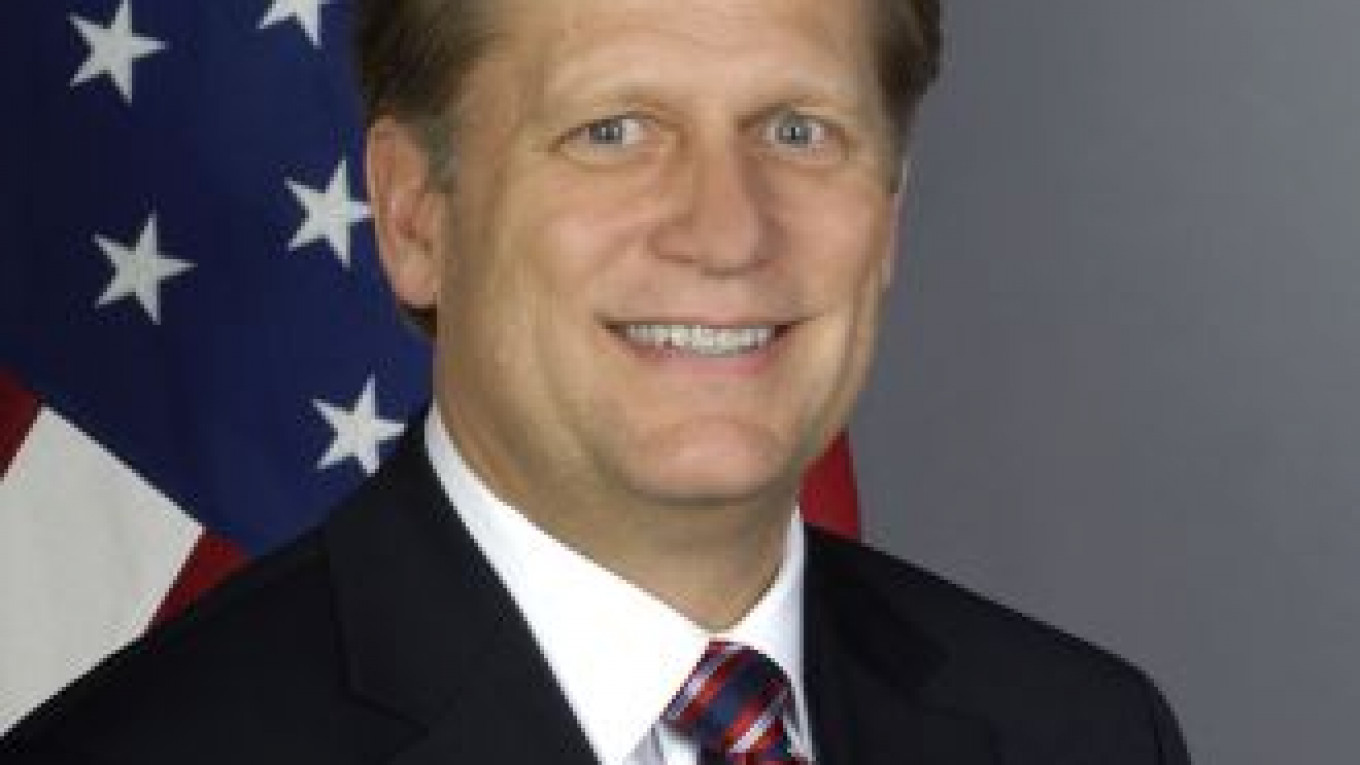U.S. Ambassador Michael McFaul has condemned "sensational exploitations" of the recent death of a Russian toddler in the United States and said he is "troubled" by portrayals of the U.S. legal system, government and the American people in the Russian press.
"It is time for sensational exploitations of human tragedy to end and for professional work between our two countries to grow, on this issue and many others," McFaul wrote in a blog post published on the embassy's website late Thursday night.
Russian officials, led by children's ombudsman Pavel Astakhov, have accused the U.S. government of being indifferent to the death of 3-year-old Max Shatto, who was adopted from Russia by U.S. parents late last year, and state-run media have amplified their criticism.
The war of words, coming less than two months after Russia banned U.S. adoptions, seemed to mark a further deterioration in U.S.-Russian relations, which have suffered since Vladimir Putin's return to the presidency in May ushered in a crackdown on critics and nonconformists.
In his statement, which was uncustomarily long and vehement, McFaul put forth a point-by-point rebuttal to accusations leveled since Monday, when the news of Shatto's death broke in Russia.
He denied Astakhov's claim that the State Department waited "almost a month" to inform Russia of the Shatto's death, which occurred on Jan. 21, and then denied access to Max's 2-year-old brother, Kristopher, who was adopted by the same Texas family last year.
"From the moment we in the State Department learned about Max Shatto's death, we have worked closely and quietly with Russian diplomats in Moscow and Houston to provide consular access to Max's brother," McFaul wrote.
He also denied a claim by Alexei Pushkov, the hawkish head of the State Duma's International Affairs Committee, who said McFaul's refusal to testify before the Duma meant that the United States was not ready for "serious dialogue."
"As a worldwide practice, American ambassadors do not testify before foreign parliaments when summoned to do so," McFaul wrote, reiterating messages posted earlier on his Twitter microblog.
And finally, he railed against a perception, frequently insinuated by supporters of the adoptions ban but seldom spoken, that U.S. adoptive parents are disproportionately likely to abuse their children.
"Tragically, some Americans have abused their children. … But I also know that the overwhelming majority of American parents provide loving and safe homes for their children, irrespective of whether they are biological or adopted, or were born in the U.S., Russia or elsewhere," McFaul wrote.
Americans have adopted an estimated 60,000 Russians in the last two decades. Twenty, including Max Shatto, are known to have died, and government officials have said a string of abuse cases necessitated safeguards introduced last year, and a blanket ban as of Jan. 1.
The so-called Dima Yakovlev Act, which outlawed U.S. adoptions, was widely seen as a response to a new U.S. law that called for sanctions against Russian suspected rights abusers.
The ambassador's missive failed to win over Pushkov, who seemed to dismiss it in a series of Twitter messages on Friday evening as reports surfaced in the Russian press about an adopted Ukrainian boy who was shot dead by his American father in June 2011.
"When Russia accuses the United States of something, it's 'anti-American hysteria.' When the United States criticizes us, it's only for 'Russia's own good,'" Pushkov wrote.
The Kremlin, which has mostly kept silent in the latest adoptions dispute, on Sunday called on all sides to lower their voices. "In this case, I think it's essential that emotions be reigned in a little bit," Putin's spokesman on Friday evening.
Officials have said they will fight to have Max's younger brother, Kristopher, returned to Russia, something a spokesman for Texas Child Protective Services said was virtually out of the question.
"That's nothing that we would consider at all," said spokesman Patrick Crimmins, adding that if Kristopher were removed from Laura Shatto's care, it would be to her relatives or foster care, not back to Russia, local news Friday.
Contact the author at j.earle@imedia.ru
Related articles:
A Message from The Moscow Times:
Dear readers,
We are facing unprecedented challenges. Russia's Prosecutor General's Office has designated The Moscow Times as an "undesirable" organization, criminalizing our work and putting our staff at risk of prosecution. This follows our earlier unjust labeling as a "foreign agent."
These actions are direct attempts to silence independent journalism in Russia. The authorities claim our work "discredits the decisions of the Russian leadership." We see things differently: we strive to provide accurate, unbiased reporting on Russia.
We, the journalists of The Moscow Times, refuse to be silenced. But to continue our work, we need your help.
Your support, no matter how small, makes a world of difference. If you can, please support us monthly starting from just $2. It's quick to set up, and every contribution makes a significant impact.
By supporting The Moscow Times, you're defending open, independent journalism in the face of repression. Thank you for standing with us.
Remind me later.






